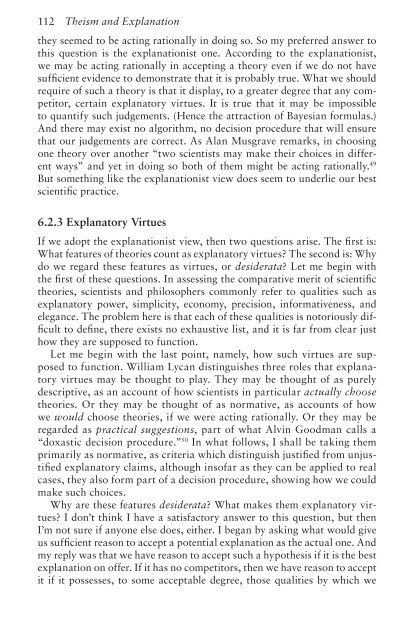Theism and Explanation - Appeared-to-Blogly
Theism and Explanation - Appeared-to-Blogly
Theism and Explanation - Appeared-to-Blogly
Create successful ePaper yourself
Turn your PDF publications into a flip-book with our unique Google optimized e-Paper software.
112 <strong>Theism</strong> <strong>and</strong> <strong>Explanation</strong><br />
they seemed <strong>to</strong> be acting rationally in doing so. So my preferred answer <strong>to</strong><br />
this question is the explanationist one. According <strong>to</strong> the explanationist,<br />
we may be acting rationally in accepting a theory even if we do not have<br />
suffi cient evidence <strong>to</strong> demonstrate that it is probably true. What we should<br />
require of such a theory is that it display, <strong>to</strong> a greater degree that any competi<strong>to</strong>r,<br />
certain explana<strong>to</strong>ry virtues. It is true that it may be impossible<br />
<strong>to</strong> quantify such judgements. (Hence the attraction of Bayesian formulas.)<br />
And there may exist no algorithm, no decision procedure that will ensure<br />
that our judgements are correct. As Alan Musgrave remarks, in choosing<br />
one theory over another “two scientists may make their choices in different<br />
ways” <strong>and</strong> yet in doing so both of them might be acting rationally. 49<br />
But something like the explanationist view does seem <strong>to</strong> underlie our best<br />
scientifi c practice.<br />
6.2.3 Explana<strong>to</strong>ry Virtues<br />
If we adopt the explanationist view, then two questions arise. The fi rst is:<br />
What features of theories count as explana<strong>to</strong>ry virtues? The second is: Why<br />
do we regard these features as virtues, or desiderata? Let me begin with<br />
the fi rst of these questions. In assessing the comparative merit of scientifi c<br />
theories, scientists <strong>and</strong> philosophers commonly refer <strong>to</strong> qualities such as<br />
explana<strong>to</strong>ry power, simplicity, economy, precision, informativeness, <strong>and</strong><br />
elegance. The problem here is that each of these qualities is no<strong>to</strong>riously diffi<br />
cult <strong>to</strong> defi ne, there exists no exhaustive list, <strong>and</strong> it is far from clear just<br />
how they are supposed <strong>to</strong> function.<br />
Let me begin with the last point, namely, how such virtues are supposed<br />
<strong>to</strong> function. William Lycan distinguishes three roles that explana<strong>to</strong>ry<br />
virtues may be thought <strong>to</strong> play. They may be thought of as purely<br />
descriptive, as an account of how scientists in particular actually choose<br />
theories. Or they may be thought of as normative, as accounts of how<br />
we would choose theories, if we were acting rationally. Or they may be<br />
regarded as practical suggestions, part of what Alvin Goodman calls a<br />
“doxastic decision procedure.” 50 In what follows, I shall be taking them<br />
primarily as normative, as criteria which distinguish justifi ed from unjustifi<br />
ed explana<strong>to</strong>ry claims, although insofar as they can be applied <strong>to</strong> real<br />
cases, they also form part of a decision procedure, showing how we could<br />
make such choices.<br />
Why are these features desiderata? What makes them explana<strong>to</strong>ry virtues?<br />
I don’t think I have a satisfac<strong>to</strong>ry answer <strong>to</strong> this question, but then<br />
I’m not sure if anyone else does, either. I began by asking what would give<br />
us suffi cient reason <strong>to</strong> accept a potential explanation as the actual one. And<br />
my reply was that we have reason <strong>to</strong> accept such a hypothesis if it is the best<br />
explanation on offer. If it has no competi<strong>to</strong>rs, then we have reason <strong>to</strong> accept<br />
it if it possesses, <strong>to</strong> some acceptable degree, those qualities by which we



